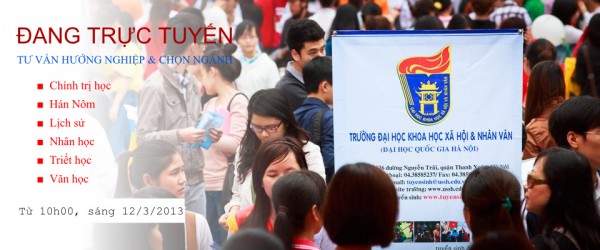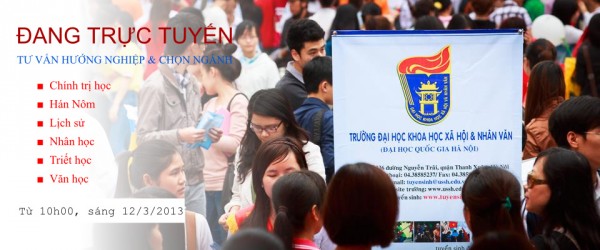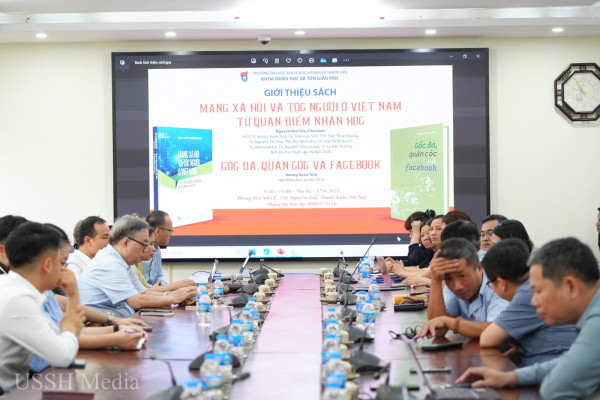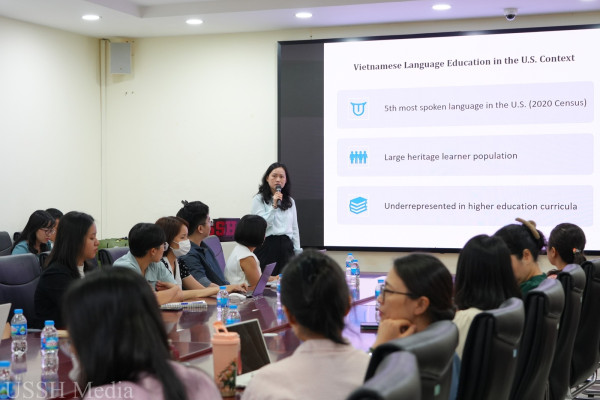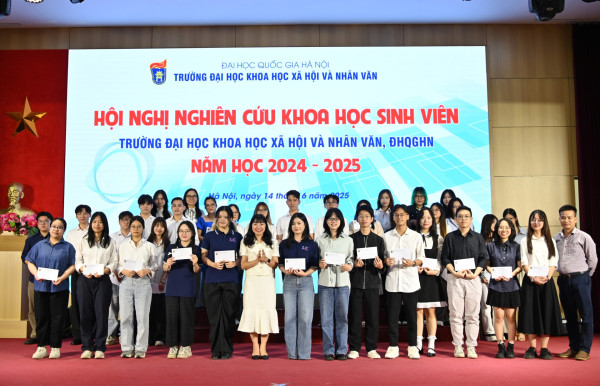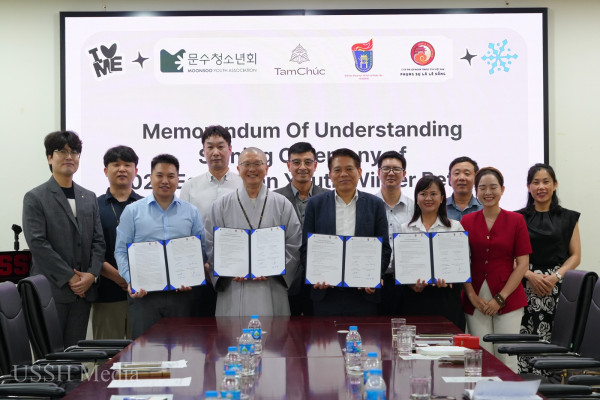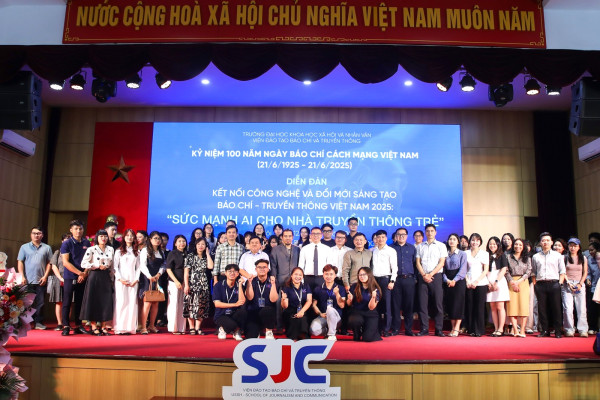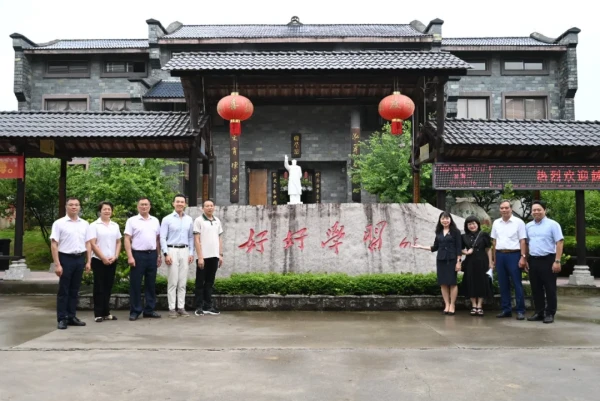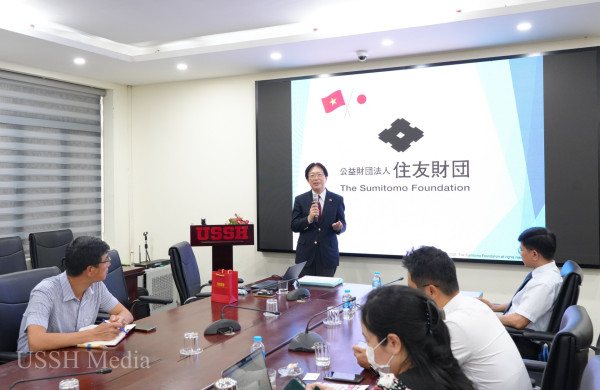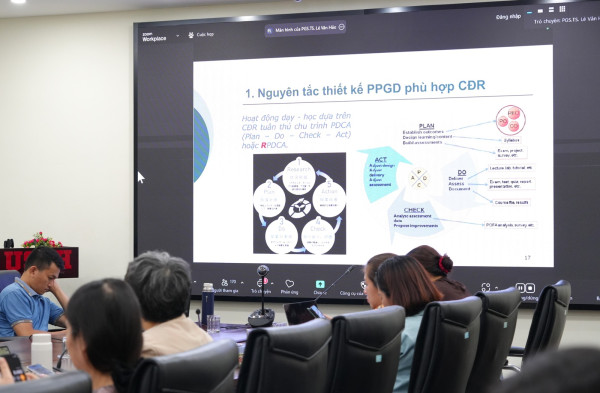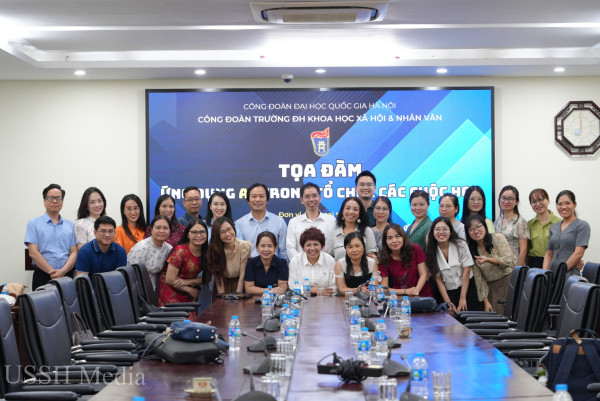Welcome to the online university admissions consulting program of the University of Social Sciences and Humanities (VNU).
Today's consultation program is dedicated to the basic science majors of the University of Social Sciences and Humanities. These are History, Philosophy, Literature, Han Nom, Political Science, and Anthropology.
The consultation program will end at 11:30 today, but all questions from candidates will be answered the next day after the program ends.
Chairing today's consultation session is Associate Professor, Dr. Nguyen Van Kim (Vice Principal, Permanent Deputy Secretary of the Party Committee) and teachers:
1. GVC Tran Hinh - Literature Department
2. MSc. Dinh Thanh Hieu - Han Nom Department
3. Associate Professor, Dr. Nguyen Van Suu - Anthropology
4. Dr. Tran Thi Hanh - Philosophy
5. Dr. Tran Thien Thanh - History
6. Dr. Luu Minh Van - Political Science
7. MSc. Dinh Viet Hai - Deputy Head of Training Department
Question: I would like to ask about the support for students majoring in basic sciences at the school this year. Are students exempted from tuition fees?
MSc. Dinh Viet Hai:Hello, first of all, I would like to introduce to you a list of basic sciences including:
- Political science
- Han Nom
- History
- Anthropology
- Philosophy
- Literature
When admitted to one of the above majors, students still pay normal tuition fees, but in addition to the study encouragement scholarship and sponsorship scholarship, students are provided with study support funding as in 2012, which was 4,200,000 VND/school year/student.
In addition, students can study (tuition-free) courses on career skills development, information literacy development, positive thinking and debate, English learning methods, etc. right in the first year of study.
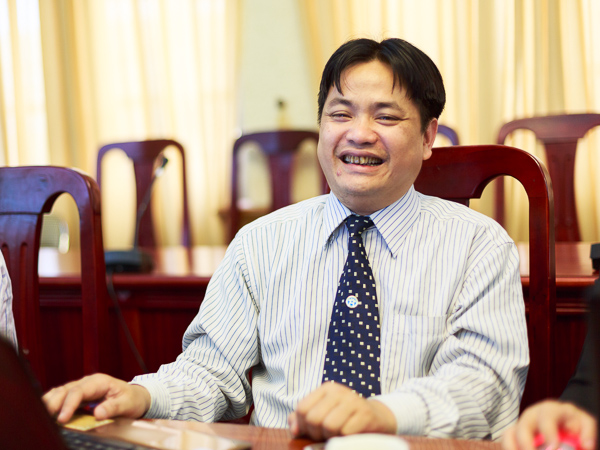
MSc. Dinh Viet Hai - Deputy Head of Training Department.
Question: Dear advisory board, I would like to ask if studying Literature will result in a journalism degree?
MSc. Dinh Viet Hai:I can assure you that there is no such thing. Students majoring in Literature are awarded a Bachelor of Literature degree upon graduation. If you want to have a Bachelor of Journalism degree from the University of Social Sciences and Humanities, you must take the entrance exam and be admitted to the Journalism major, complete the course, and be recognized as a graduate.
However, what you and your friends should know is that from the next school year, the University of Social Sciences and Humanities will open additional dual degree programs in Journalism, International Studies, and Management Science (currently the University has a dual degree in Tourism and Travel Services Management) for students of all majors in the University who wish to study for dual degrees in these majors.
Assuming that you take the exam and are admitted to the Literature major, at the end of the 2013-2014 school year (the first year), if you meet the learning requirements in the training regulations, you will be considered for admission to the Journalism major, a dual degree training program (note that admission is based on the first year's learning results in the Literature major, not on retaking the university entrance exam). If admitted, you will be both a Literature major and a Journalism major, and after a maximum of 6 years, you can have 2 bachelor's degrees in Literature and Journalism.
I wish you good health and choose a major that suits your career direction and abilities!
Question: I want to know about the admission quota of Political Science major in previous years? I hope the teachers can advise me.
Dr. Luu Minh Van:In 2008 and 2009, the Political Science Department began enrolling students for undergraduate training. According to regulations for newly introduced majors, the quota for the two courses is limited to 50 students.
Since 2010, in response to the growing demand of candidates, the Political Science Department has increased its enrollment quota to 70 students. In 2013, the enrollment quota was 68 students.
Hope to see you as one of the 68 students of Political Science.
Good luck!
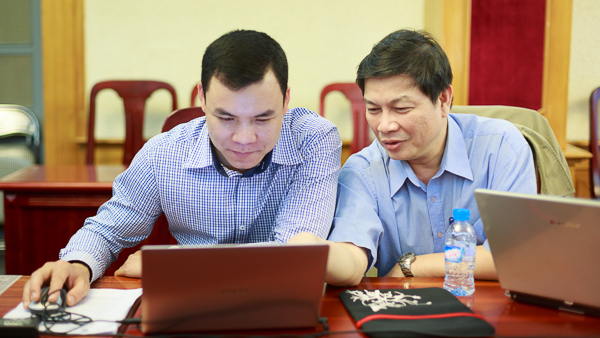
Dr. Luu Minh Van (right) and MSc. Dang Anh Dung (Faculty of Political Science).
Question: I am wondering about choosing a major, especially between Anthropology and some other majors. Can you introduce me to the job opportunities in Anthropology after graduation?
Associate Professor, Dr. Nguyen Van Suu:You are a really far-sighted person because you have thought about what you will do when you graduate from university!
Let me put it briefly like this. The current Anthropology major at the University of Social Sciences and Humanities was transformed and developed from the Ethnology major. Ethnology has been taught in Vietnam and in the Department of Anthropology since the 1960s. As of 2011, on average, there were dozens of students majoring in Ethnology each year. Most of the graduates have jobs.
People with a bachelor's degree in Anthropology continue to work in the above-mentioned agencies, but with better professional qualifications and abilities because the Anthropology training program equips them with more systematic and comprehensive knowledge of both theory, methods and basic concepts of the field of study.
Our survey shows that they have been working at the Ethnic Committee, the Department of Culture, Sports and Tourism, the Ministry of Education and Training, museums, tourist areas, conservation areas, libraries, and the Ethnic Committee in the provinces. Some teach at universities, work at research institutes, some work at international organizations operating in Vietnam, some go to graduate school in developed countries in America, Europe, Australia, etc.
We have posted an article introducing job opportunities for students majoring in Anthropology on the website of the Department of Anthropology at: http://nhanhoc.edu.vn. Please take the time to read it to learn more about Anthropology, the Department of Anthropology and the great job opportunities for people with an Anthropology degree.
Good luck and find your dream career.
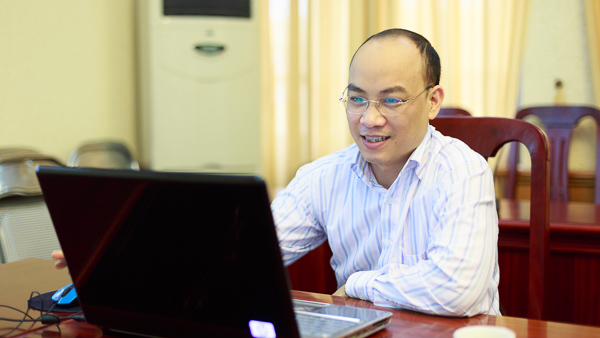
Associate Professor, Dr. Nguyen Van Suu (Department of Anthropology).
Question: I would like to know information about career opportunities after graduating from Political Science?
Dr. Luu Minh Van: The demand of the labor market for human resources in Political Science is increasing, while this science has just been introduced into the training system of universities and colleges in Vietnam, therefore, the career opportunities for students graduating from Political Science are very large. Specifically, students graduating from Political Science can do the following jobs:
+ Do advisory work in the Party and State's policy-making agencies.
+ Working as a consultant in agencies and organizations of the political system and socio-economic organizations.
+ Do research work at political theory agencies.
+ Work as a reporter, editor, commentator on current events and politics at central and local newspapers and radio stations.
+ Doing research and teaching political science in the Party school system, universities, colleges, and professional and vocational high schools.
In 2012, 31/42 students of the first course of Political Science graduated and found jobs. In addition to the above fields of work, some students are working in programs and projects of non-governmental organizations.
Question: In 2012, I took the Linguistics entrance exam but failed. This year I want to take the Literature entrance exam. However, I am worried that I will not be able to prepare well for the exam, so I hope the counselor can give me some advice on how to prepare for the exam.
GVC Tran Hinh: Regarding your entrance exam to the Faculty of Literature, I would like to correct that the Faculty of Literature is the old name of the two previous Faculties of Literature and Language. Now there are only two Faculties of Language and Literature. So I think you probably want to take the entrance exam to the Faculty of Literature this year. You took the exam last year, so I think that taking the exam again this year will give you more experience and there is nothing difficult. In my opinion, you do not need to take any intensive classes, but should self-study, and you can study each subject or all three subjects in parallel, whichever way you like to study. For the Literature subject, you should pay attention that there will be a book on Literature Exam Review Guide according to the exam situation written by Tran Hinh in the near future. It is best for you to find that book to study. As for the remaining two subjects of History and Geography, you should ask the experts of those two faculties which book is the best at present to study based on that. There is no better way than self-studying with a short time like yours now. I wish you good luck on your exam.
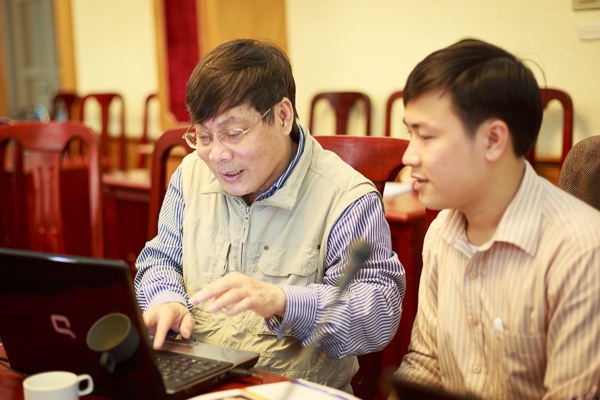
GVC Tran Hinh (Faculty of Literature)
Question: This year, I intend to take the History exam. Can you advise me on what subjects are included in the History major? Thank you.
* Positions students can take after graduation:
* Types of agencies, organizations and businesses with suitable working capabilities and opportunities:
- Universities, colleges and high schools teach history and the subject of the Revolutionary Path of the Communist Party of Vietnam.
- State agencies and organizations that use historical knowledge (central agencies of the political system, press agencies, People's Committees at all levels, museums, historical-cultural research centers, historical relic management units, publishing houses, historical magazines...).
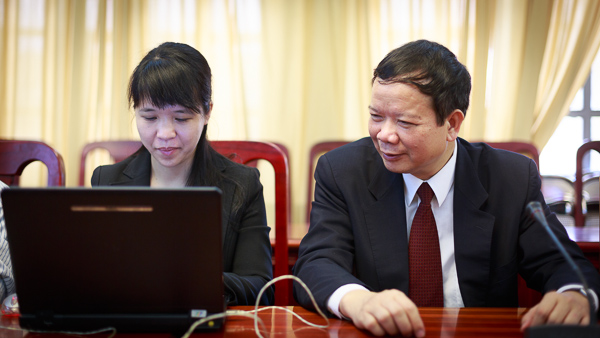
Dr. Nguyen Thien Thanh (left) and Associate Professor Dr. Nguyen Van Kim (right)
Thank you for your question! If your goal and passion is to research documents, “read ancient texts” and “ancient cultures”, then among the two majors of Han Nom and History at the University of Social Sciences and Humanities, Han Nom is closer to your goal. The Han Nom training program equips students with the necessary knowledge and skills to approach, process and exploit Han Nom texts, with basic knowledge of social sciences and humanities, basic linguistic knowledge, specialized knowledge including: Ancient Han (China, Vietnam), Nom script, Nom texts and traditional cultural knowledge, specialized theory, combining knowledge within Han Nom (internal Han Nom - Han Nom texts) with knowledge outside Han Nom (external Han Nom) in terms of history, culture, literature... to exploit the values contained in Han Nom heritage to serve Vietnamese life, connecting the national cultural stream from tradition to modernity. Learners are also equipped with foreign language skills (Modern Chinese) to be able to communicate commonly and read basic professional documents, skills in applying specialized Han Nom computer skills and necessary skills to access, process and exploit rich and diverse Han Nom documents in practice.
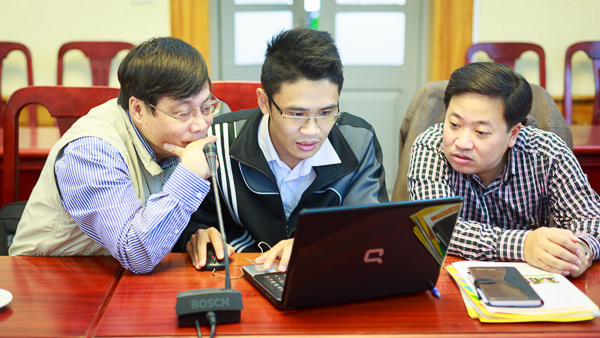
GVC Tran Hinh (left) and MSc Dinh Thanh Hieu (right)
Question: Is the knowledge of Literature in university similar to what I learned in high school? When I study at university, what other knowledge will I learn besides the literary works like in high school?
GVC Tran Hinh:
Basically, the knowledge of Literature in university is broader and deeper. In high school, the knowledge of literature mainly focuses on studying Vietnamese literature works, very little foreign literature, and there is not much expansion. In university, we will have to study more. For example, in addition to literature including Vietnamese literature and foreign literature (French, English, German, Chinese, American, East Asian and Southeast Asian...), we also study Literary Theory, Han Nom, Journalism and especially Art Studies, specifically the three art groups of Cinema, Theatre and Television. Thanks to the above knowledge, students after graduating from Literature will be able to work in many different jobs such as literary research, journalism and television, publishing, teaching and many other media fields... In addition to basic knowledge, the Faculty of Literature also equips students with professional skills, so I think, if you have the will and aspiration, then after graduating from the Faculty of Literature, you will definitely have many job opportunities. And of course, studying literature at university, although not exactly the same as in high school, is not too unfamiliar... The Faculty will be responsible for guiding students in learning skills. Wish you success.
Question: Dear Sir/Madam, I understand that the Faculty of History is the only training unit in the country that trains in the field of Archaeology. I am very interested in this field of study. I would like to ask you for specific information about this field and job opportunities for students after graduation. Thank you.
Dr. Tran Thien Thanh: The Department of Archaeology (Faculty of History - University of Social Sciences and Humanities) is the only training institution that has built a complete training system from undergraduate to graduate and doctoral levels in Archaeology. The training program of the Department is built and updated, based on learning from experiences from many countries such as France, Russia, and the United States. The Department also expanded its cooperative relations with many major universities in the world with highly developed archaeological sciences such as Seoul National University (Korea), Kanazawa University (Japan), Sun Yat-sen University (China), the Institute of Archaeology of the Federal Republic of Germany... Many major cooperative projects were implemented such as the AMS chronology research project of Hoa Binh culture with Seoul National University, the Sa Huynh culture research project with the German Institute of Archaeology, the Cultural Heritage Training and Research Project with Kanazawa University... In the country, the team of experts and scientists of the Department have contributed their efforts and left their mark with the discovery and excavation of many archaeological cultures of the country. The recognition of Hoi An, My Son, and Hue Citadel as world heritages also owes much to the teachers of the Department.
Students of the Faculty of History from the third year can register to study this major if they meet the requirements of academic ability. In the first three years, students learn general knowledge about history. In the fourth year, they learn specialized knowledge such as the basic characteristics of Vietnamese and world archaeology, the latest archaeological achievements, etc.; lecturers help them approach practical problems of the industry. In addition, the Department focuses on training excavation skills, going to the field, organizing work, and training students to work independently.
Agencies and units that need to recruit students majoring in this field are the Institute of Archaeology (under the Vietnam Academy of Social Sciences), the National Museum (formerly the Vietnam Museum of History), other archaeological management agencies, museums and local relic management boards. In addition, many agencies and companies working in tourism also need to recruit students majoring in Archaeology. In particular, since 2001, the State has issued the Law on Cultural Heritage with clear regulations on the standards of human resources working in the field of Archaeology. This has opened up great job opportunities for students majoring in this field. Archaeology students are also very active in seeking professional experiences right from their second and third years. Many have been able to follow domestic and foreign expert groups to excavate archaeological sites in many large projects. All of these advantages help students respond well to future jobs.
Question: Is it difficult to study philosophy?
Dr. Tran Thi Hanh: Studying philosophy is not difficult if we are passionate and really want to explore and learn about human knowledge: East - West, ancient and modern...
In the philosophy program: students learn social science subjects such as economics, political science, history of world civilizations... specialized philosophy subjects: Chinese, Indian, Vietnamese, Greek, Roman, French, German, Italian, American philosophy, specialized topics of specialized directions: Marxist-Leninist philosophy, Logic, Religious studies, Aesthetics, Ethics, History of philosophy, Scientific socialism... methodological and professional subjects: scientific research methods, teaching methods, writing skills, sociological investigation skills. Practical internship subjects, writing the thesis, the philosophy program also focuses on developing students' scientific research ability. Every year, students are allowed to register for scientific research topics, if they win a prize, they can have their points transferred to replace a specialized subject.
Hope you will achieve your wish and be successful!

Dr. Tran Thi Hanh – Deputy Head of Philosophy Department
Question: When advising me on choosing a major for the university entrance exam, my teacher said I should take the Political Science major, but I don't understand anything about this major. I hope the teacher can answer.
Dr. Luu Minh Van:
- The homeroom teacher's opinion is worth considering because she understands the profession and is responsible for her students.
- Political science is a very young and new field of study at the University of Social Sciences and Humanities, VNU in particular, and the whole country in general. In the past, everyone thought that politics was power, political science was the science of studying the acquisition and maintenance of power, with a mother principle that all power belongs to the people. Now the concept of politics and political science needs to be expanded, not only the issue of organizing power, but also the science of studying human rights, of the community. Research on politics is gradually becoming a popular activity, daily behavior of each person, but to understand, it is necessary to research in a truly scientific way. Research on Political Science in the world in general and in Vietnam in particular is increasingly rich, vivid and intimate. Although there are still many difficulties and challenges, Political Science is a promising field, one can stick with for a lifetime.
- I would like to add one more thing: The University of Social Sciences and Humanities is a pioneer in the system of universities and colleges nationwide in training and researching Political Science. Through several years of training both undergraduate and postgraduate levels in Political Science, the University of Social Sciences and Humanities has affirmed its position and reputation.
- You can refer to the online training program of the University of Social Sciences and Humanities (ussh.edu.vn) for more information about Political Science.
Question: Is Philosophy the same subject as Civic Education?
Dr. Tran Thi Hanh:
Philosophy is not Civic Education.
Philosophy is almost as old as Mathematics, is one of the basic disciplines of social sciences, is the science that provides the correct worldview and methodology for human cognition and practical activities in the process of conquering and transforming the world to serve human existence and development. It is impossible to have the level of abstract thinking and reasoning at the universal level without being equipped with philosophical knowledge.
In the current development of our country, the most lacking and weakest thing that we all see is the strategic theoretical thinking for the development in each field as well as the whole society. To improve the theoretical thinking, philosophical science is the core.
Civic education in general education only opens up the simplest issues in the fields of politics, society, culture and ideology.
Students who study philosophy and graduate from university can teach civic education in high schools.
Students who have graduated from the Civic Education major at the Pedagogical University can receive additional philosophical knowledge and study a Master's program in philosophy, from which they can teach at vocational high schools, colleges, universities, academies, etc. Job opportunities are always open to them.
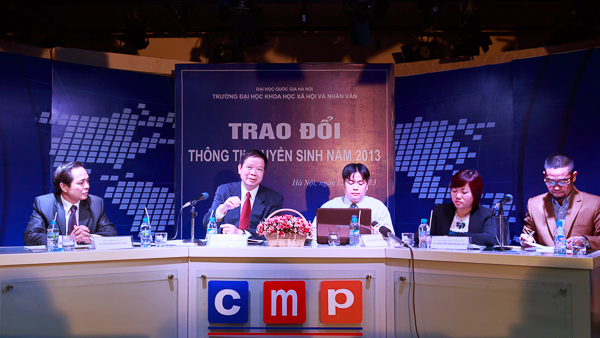
Press meeting to exchange information on 2013 enrollment of the University of Social Sciences and Humanities, this morning, March 12, 2013.
Question: I heard that if I study Han Nom, I have to learn Chinese, but in high school I studied English. When I go to university, will I be able to learn Chinese from the beginning? How long will it take to be able to understand Chinese texts? Also, is our Nom script any different from Chinese script?
MSc. Dinh Thanh HieuYour question is quite broad, I will briefly answer as follows:
In the Han Nom training program, the required foreign language is Chinese. When entering the program, you will learn Chinese from the beginning. After graduation, students are equipped with Chinese language skills at the level of common communication and can read basic professional documents. It is difficult to say "how long do you have to study to be able to understand Han Nom texts" because the ocean of knowledge is vast, learning is a lifelong process, but after graduating from the 4-year Han Nom training program, students are equipped with the necessary knowledge and skills to approach, process, and exploit Han Nom texts, such as collecting, appraising, and translating common Han Nom texts, initially exploiting the value contained in the Han Nom heritage. Nom script is a script created by Vietnamese people on Han characters to write Vietnamese. Therefore, to learn Nom script, one must have a certain level of Han script proficiency. The specialized knowledge of Han Nom major includes Nom scripts and Nom texts, including theory of Nom scripts, practice of reading Nom texts, Nom transcription, Nom text analysis...
Question: Dear Teacher, since high school, I have studied and read many history books with very interesting content by authors such as Phan Huy Le, Dinh Xuan Lam, Vu Duong Ninh, Le Mau Han, Vu Quang Hien... After registering and being admitted to the History major, will I be able to directly study and listen to lectures from the above mentioned teachers?
Dr. Tran Thien Thanh:Due to their outstanding achievements in training and scientific research, many generations of staff of the Faculty of History have received many prestigious domestic and international awards and titles in science and technology, education and training: Ho Chi Minh Prize: Professor Tran Van Giau, Professor Dao Duy Anh, Professor Ha Van Tan, Professor Tran Quoc Vuong;
State Awards: Professor Phan Huy Le, Professor Phan Dai Doan, Professor Phan Huu Dat, Associate Professor Nguyen Thua Hy. International: Professor Phan Huy Le: Fukuoka International Prize for Asian Culture, Japan (1996), French Government's Academic Palm Medal (2002), Corresponding Member of the French Academy of Letters, Literature and Fine Arts (2011). People's Teachers: Professor Dinh Xuan Lam, Phan Huy Le, Ha Van Tan, Phan Huu Dat, Le Mau Han, Vu Duong Ninh, Hoang Van Khoan, Nguyen Van Hong, Trinh Nhu, Nguyen Quoc Hung, Han Van Khan.
Excellent Teachers: Tran Quoc Vuong, Pham Thi Tam, Nguyen Thua Hy, Phung Huu Phu, Vu Minh Giang, Nguyen Quang Ngoc, Nguyen Van Khanh, Pham Xanh, Hoang Luong, Ngo Dang Tri, Nguyen Hai Ke.
When admitted to the History major, you will be able to listen to lectures on specialized topics (at many different levels, especially master's and doctoral levels), read the latest works of many teachers stored in the History Faculty's Archives or other sources introduced by lecturers and staff of the Faculty and have the opportunity to receive comments from teachers on your personal research directions. In addition, you and other students admitted to the History major will receive lectures from highly prestigious teachers in the next generations of the above professors, who will give comments on your personal research directions... whom I am sure you also know such as Associate Professor, Dr. Nguyen Hai Ke, Associate Professor, Dr. Nguyen Dinh Le, Associate Professor, Dr. Vu Van Quan, Associate Professor, Dr. Nguyen Van Kim, Associate Professor, Dr. Lam My Dung...
Question: I would like to ask the teachers to tell me what Anthropology is and what knowledge will students studying Anthropology learn?
Associate Professor, Dr. Nguyen Van Suu - Deputy Head of Anthropology Department:
Thank you for your interest in Anthropology! Born in the 19th century, Anthropology has a particularly important academic position, profound practical significance, and high internationality. It has been and is being taught at many universities in the region and around the world.
With the subject of study being humans, Anthropology has many fields of academic and applied research, some of which include:
Socio-cultural anthropology studies the internal dynamics of societies through ethnographic descriptions. This is an important field that studies the worldview of people in different cultures and countries, studying the lives of ethnically diverse communities with cultural and social characteristics, such as communities of residents in mountainous areas, communities of farmers, fishermen, traders, craftsmen, etc. in the plains and river regions and townspeople in urban areas. Socio-cultural anthropology also studies religious life, studies languages, social systems and social organizations, livelihoods, exchanges, technology, political systems, ecology, psychology, art, etc., of humans with the aim of decoding the similarities and differences of different communities and ethnic groups.
- Physical anthropology pursues our human biological origins, evolutionary development, and genetic diversity.
- Linguistic anthropology seeks to explain the nature of language and human use of language.
- Medical anthropology seeks a more complete understanding of the factors that influence human health and well-being.
- Forensic anthropology seeks to identify skulls or decipher the remains of human bodies.
- Business anthropology helps businesses gain a better understanding of their operations and customers.
- Visual anthropology collects everyday life through film
- Environmental anthropology believes that human well-being is inseparable from environmental harmony and well-being.
- Museum anthropology introduces and explains to the public the significance of ethnographic and archaeological collections.
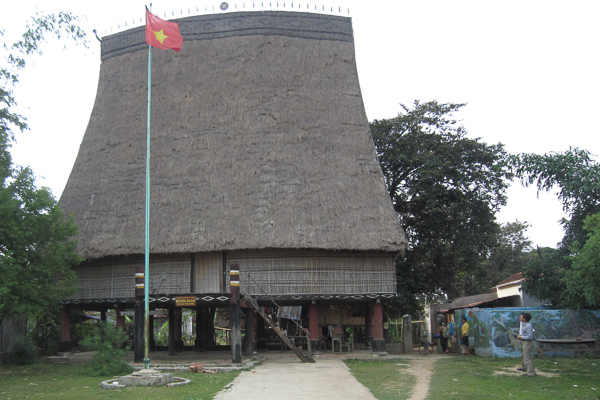
Lecturer of Anthropology Department surveyed the communal house of the Ba Na people in Kon Tum province, Central Highlands.
In Anthropological research, research methods and theories have an important position. In the history of development, Anthropology has built a system of ethnographic field research methods such as participant observation, semi-structured interviews and interdisciplinary research techniques to collect ethnographic materials in specific research areas. Along with that, Anthropology has produced many different theoretical schools to explain culture, society and human nature.
The undergraduate program in Anthropology provides knowledge of all the above fields. Students also experience ethnographic internships and research practices to train and improve their capacity so that upon graduation, they can grasp job opportunities well. You should see more information about undergraduate and graduate programs in Anthropology at the website: nhanhoc.edu.vn.
Question: My friend invited me to take the Political Science exam together, but my friend is enthusiastic and participates in many social activities, has leadership ability, while I am the opposite. So, according to the teachers, should I take the Political Science exam?
Dr. Luu Minh Van:Hi Tuan, your question is very good!
First of all, I think you should be confident in your own abilities.
Don’t think that studying Political Science will only help you become a leader. You can also do research, analysis, political commentary, consulting, and advising – jobs that require perseverance and composure like you.
I also think that in the process of studying and working in the future, you will realize your own strengths and will succeed.
After the entrance exam, I really hope to see you at the Faculty of Political Science and please "reveal" that you asked this question.
Assoc.Prof.Dr. Nguyen Van Kim - Permanent Deputy Secretary, Vice Principal of the School: The online admissions consultation program of the University of Social Sciences and Humanities on March 12, 2012 has ended. Thank you to parents, students and readers who participated in the program. Due to limited time, we cannot immediately answer all questions from candidates, so the Advisory Board will continue to answer after this consultation session.


